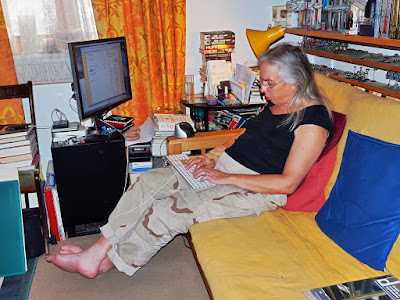 |
| H. P. Lovecraft creator of the Cthulhu Mythos. |
If you have scrolled down the page lately, you will have seen my new progress statement about my first novel,
The Bureau. It had been relegated to my metaphorical bottom draw. Reviewing my files and blog entries, I see that the last time I did any significant amount of work on it was back in January 2015. The project has, up to now, been well and truly stuck.
My excuse is that the story was in the grip of Eldritch forces, but now the stars have moved it has escaped.
The truth is a little bit more complicated than that. I first started writing
The Bureau back circa 1986 and it was my attempt to write a six issue comic that would be turned into a graphic novel. My inspiration came from watching a highly acclaimed series on the BBC called the
Edge of Darkness.
I'm not ashamed to admit that I was playing a lot of
Call of Cthulhu games at the time. They were a lot of fun, and I have many fond memories of my friend Kevin running campaigns, where invariably we all went mad.
Anyway, inspired by these two things, I had an idea to write a Lovecraftian comic book story that rifted on
Edge of Darkness. I managed to complete three episodes of my story. My friend Alex Stewart read the first them and commented that
The Bureau felt like Lovecraft meets
The Professionals, which is a great pitchline. Unfortunately, the artist, who I was thinking of working with, told me he couldn't draw what I was writing.
That as they say put a damper on things.
A little later my life became very difficult, and everything got put aside, because I had to go off and work to make money to have somewhere to live. This meant I dropped out of writing thirteen years, and it wasn't until 2004 that I found my hand written first draft, and I decided to copy type my manuscript onto the computer, with the intent to turn it into a novel.
And again, life got in the way, in the shape of going off to train to become a cognitive behavioral therapist.
So another eight years passed until I dug
The Bureau out to start working on it again. But then I got side-tracked by
Bad Dog, and being so inspired by the setting that I had to write two sequels to it. Since then I've tried restarting
The Bureau on two occasions, and managed to add scenes to the story, but basically I was stuck.
The reasons for this weren't immediately obvious, but with hindsight they clearly are.
This insight came from following various blogs around the web that talk about publishing.
Dean Wesley Smith and
Kristin Rusch have both talked about writing and publishing. What they write may upset you, but it's
better to be upset and knowledgeable than ignorant, and end up being
disappointed.
Anyway, they made me rethink my assumptions about what I was doing.
I realized that
The Bureau was my first novel. It had become my
preciousness, and I was trapped by
expectations I could never realistically meet. Those were rooted in
beliefs from the past about writing the best first novel that one could. But the harsh truth is that failing to finish writing a novel is more of a problem than failing to write the breakout novel that in one's imagination will sweep the world off its feet, and show people how brilliant your are.
For one very simple reason, no one can judge my writing if I haven't written anything. Besides, if my first novel is so wonderful, how on Earth would I ever be able to write something that was better?
And that was the trap I was caught in.
Realizing that, all my assumptions fell away, and I was able to sit down and revise the structure of the story and just like that everything fell into place. All my clever tricks I had wheeled out when writing
The Bureau I could now see were getting in the way of finishing the story.
To finish my piece today, I had one other insight, courtesy of Kristin Rusch, from her
post here:
The book is giving me fits, because I can’t seem to nail down the
structure. I write books out of order, as those of you who followed me
through The Freelancer’s Survival Guide know.
I wish I could change this process, but my mind sees books as a mosaic
instead of as something linear. When I finish, I have to construct the
book, rather like a quilter with scraps of fabric. If I put the scraps
together one way, I have one kind of book. If I put them together in
another, I have a completely different book.
Until I
read this, I though I was the only person doing this. I made an assumption
that other writers either outlined or wrote a story instinctively
discovering the story as they wrote it. I thought I was the only person
who shuffled scenes around to fit the story.
Again, as they say, live and learn.
















































